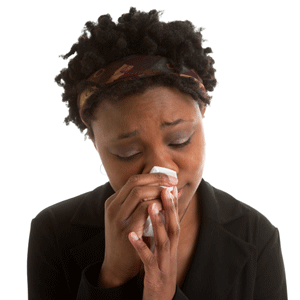
The earliest recorded case of an allergy attack was of King Menses of Egypt, who was killed by a wasp sting. According to the Auckland Allergy Clinic this happened sometime between 3640 and 3300 BC.
With evidence dating back so far, it’s easy to think that humans have always suffered from allergies to the same extent. Although allergies as such are nothing new, this ailment has been labelled “the epidemic of the 21st century” because of the sheer number of sufferers in modern times.
Research from the UK Allergy Association shows there’s an increase in allergies worldwide, and 30–35% of people suffer from an allergy at some time during their lives. Other research shows the prevalence has doubled over the last 20 years.
Even on home soil there seems to be an increase in allergies. “In the most recent large epidemiology studies of allergic rhinitis, which included South Africa, prevalence was increasing between the 1970s and 1990s,” says Prof Jonathan Peter, head of the Lung Institute at the University of Cape Town.
“Similarly, more recent data on food allergies show a significant burden of disease in SA, with higher rates among urban populations.”
Asthma
Prof Peter is especially worried about the link with asthma.
“Most alarmingly, where SA differs is that relative to the country's asthma prevalence we have a disproportionate mortality rate from acute asthma, largely reflecting health access and systems issues.”
Climate change
An important reason for this shift is a changing environment. “Environmental changes are most certainly contributing to the increasing burden of allergies,” says Prof Peter, “however the risk contributed by individual behaviour and environmental change is difficult to estimate and may differ in different settings.”
For example, climate change in and of itself may not result in allergies; however, pollen seasons may be extended or delayed, which would result in prolonged or possibly more severe allergic symptoms in patients with grass pollen allergic rhinitis.
How we prepare food
“There is some data reflecting that modern processing methods can affect the how allergenic certain foods are,” says Prof Peter.
An example is roasted versus raw peanuts by changing the protein structure of the food. Although this is likely to play a small role it definitely contributes to the overall numbers.
Evolution of immune system
Doctors are also concerned about our ability to adapt to our environment. Prof Peter thinks our immune systems have been in dynamic evolution with our environment over millennia. “[It has] been polarised by predominantly the microbial world, both the good commensal and bad pathogenic microbes, over time.”
But things are changing rapidly. “This microbial world is now changing faster than the immune system can adapt,” says Prof Peter, “leaving certain of us vulnerable to inappropriate responses to otherwise harmless molecules.”
Other factors that might cause a rise in allergies are new infant feeding practices and antibiotic usage.
Can we avoid allergies?
“We are starting to understand the factors leading to allergies and the risk for developing new allergies. However, we are not yet very effective at preventing this process through simple behaviours,” says Prof Peter. There is, however, evidence to support three guidelines:
- Introduce allergenic foods early on.
“There has been a recent guideline on the introduction of peanuts in the form of peanut butter largely for infants at 4–6 months. Parents should talk to an allergist or their paediatrician about the best approach.” - Take vitamin D, probiotics and emollient.
“They may have benefit, but there are conflicting results and we don’t yet fully know about how much, how often and when to best use these approaches to prevent allergy.” - Try allergy immunotherapy.
“This is a promising treatment which may even prevent new allergies from developing, but this is far from a simple behaviour.”
Read more:




 Publications
Publications
 Partners
Partners











